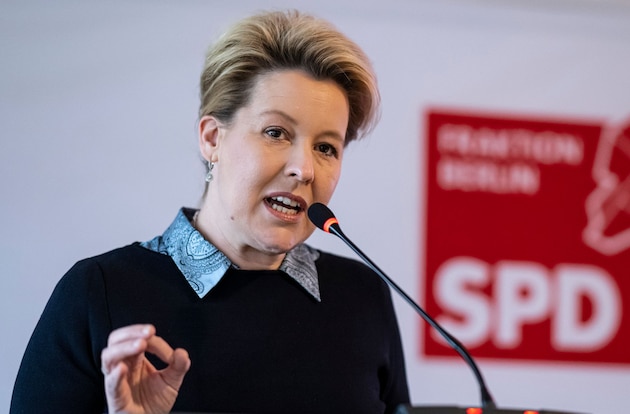The parliamentary elections will be repeated in three weeks. The parties are under particular pressure this time – if only because they are completing the campaign marathon in a much shorter time.
Berlin hasn’t seen that yet: The House of Representatives election will be repeated in its entirety because the State Constitutional Court declared the vote in autumn 2021 invalid due to many glitches and “serious systemic errors”. But the election campaign also has its peculiarities. Only at the beginning of the year did the parties put up their posters in the capital. That was three weeks ago – and there are still three weeks until election day on February 12th.
According to the most recent survey published on Wednesday, the opposition CDU is in first place with 23 percent of the voters’ favor – ahead of the co-governing Greens (21) and the SPD (18). But who will rule with whom after February 12 is considered open – if only because the CDU needs at least one of the larger parties from the red-green-red coalition. SPD state chairwoman Franziska Giffey has not explicitly ruled that out. Greens lead candidate Bettina Jarasch, on the other hand, has repeatedly stated that her favorite variant is the continuation of the current coalition – preferably with her as governing mayor.
Candidates and parties have to cope with difficult conditions in the election campaign. “No one had necessarily expected that the full program would have to be restarted,” said political scientist Thorsten Faas, who teaches at Freie Universität, to the German Press Agency. The election campaign was very short and came at a time when the election campaign coffers were empty. “This is compensated for by the fact that the top candidates in particular are incredibly busy and make appointments without end.”
A look back at halftime in the hot phase of the election campaign:
Governing Mayor Giffey already received prominent support from Chancellor Olaf Scholz (SPD) during the election campaign. He said it was annoying that the House of Representatives had to be elected again. But he was firmly convinced that the Berlin SPD would win the election again. And Giffey is the right person for it.
CDU federal chairman Friedrich Merz has announced two more campaign appearances for the state party, including one in the Neukölln district, where Giffey’s political career began and where she has her constituency, and at the closing event with top candidate Kai Wegner two days before the election. The two appeared in front of an election poster with a clear message: “Celebrate Berlin. Fire Senate.”
According to the agreement of the parties, the hot phase of the election campaign should not begin until after the New Year. But the most discussed topic was already delivered on New Year’s Eve. After riots in several parts of the city with attacks on the police and fire brigade, not only the CDU and AfD accused the red-green-red Senate of being partly responsible.
However, the Governing SPD Mayor Franziska Giffey rejected the fact that the attacks on emergency services were mainly due to unsuccessful integration and presented a series of preventive measures at a “summit against youth violence”. In a catalog of questions for the interior committee of the House of Representatives, the CDU also wanted to know the first names of suspects with German nationality – and triggered a wave of criticism in which they were accused of populism and racism. Which party benefited from the debate and which harmed it is considered open.
Surprise topic number two in the election campaign is the Berlin administration, which has been repeatedly criticized for years. People in Berlin are chronically annoyed by long waiting times for documents such as birth certificates – or even just for an appointment at the Citizens’ Registration Office. This has to change, the parties are now demanding at the same time and presented a number of proposals and papers for this during the election campaign. The most radical came from the FDP parliamentary group leader Sebastian Czaja: He advocated abolishing the district offices and instead setting up “senate branches” in the districts.
The Berlin CDU has reserved websites from the Greens and FDP with their key campaign slogans. On the corresponding election campaign page of the Berlin Greens, a bicycle can be seen in a car park – and the writing: “This domain has been parked.” The notice appears on a banner: “It’s really stupid if the space is blocked, isn’t it? The CDU has also reserved the website of the Berlin FDP with its central slogan “Let’s vote again”. In both cases, the CDU offered to release the domain again. “A donation to the cold aid would be great. Deal?” Both were received Parties don’t do it. CDU General Secretary Stefan Evers said that there were thousands of hits on the pages. “We are surprised that neither the Greens nor the FDP are interested in these ranges.”
Giffey did not particularly like the criticism of the Bavarian Prime Minister Markus Söder after the New Year’s Eve riots. The CSU boss had said that Berlin was developing into a city of chaos. Giffey then invited him to come visit and convince himself otherwise. “And if there is concrete feedback, then we’ll organize a nice program.” So far, there has been no known response from Munich.
A CDU election poster with the ambiguous text: “What criminals will hear more often in the future: arrest warrant” caused discussions. Younger voters think of the German rapper, who calls himself that, when they think of an arrest warrant, while older people think of the law. The association of Berlin criminal defense lawyers didn’t see it as a joke: “The decision on the issuance and existence of arrest warrants is the sole responsibility of the courts,” she criticized the CDU demand. “The populist election promise is in vain.”















